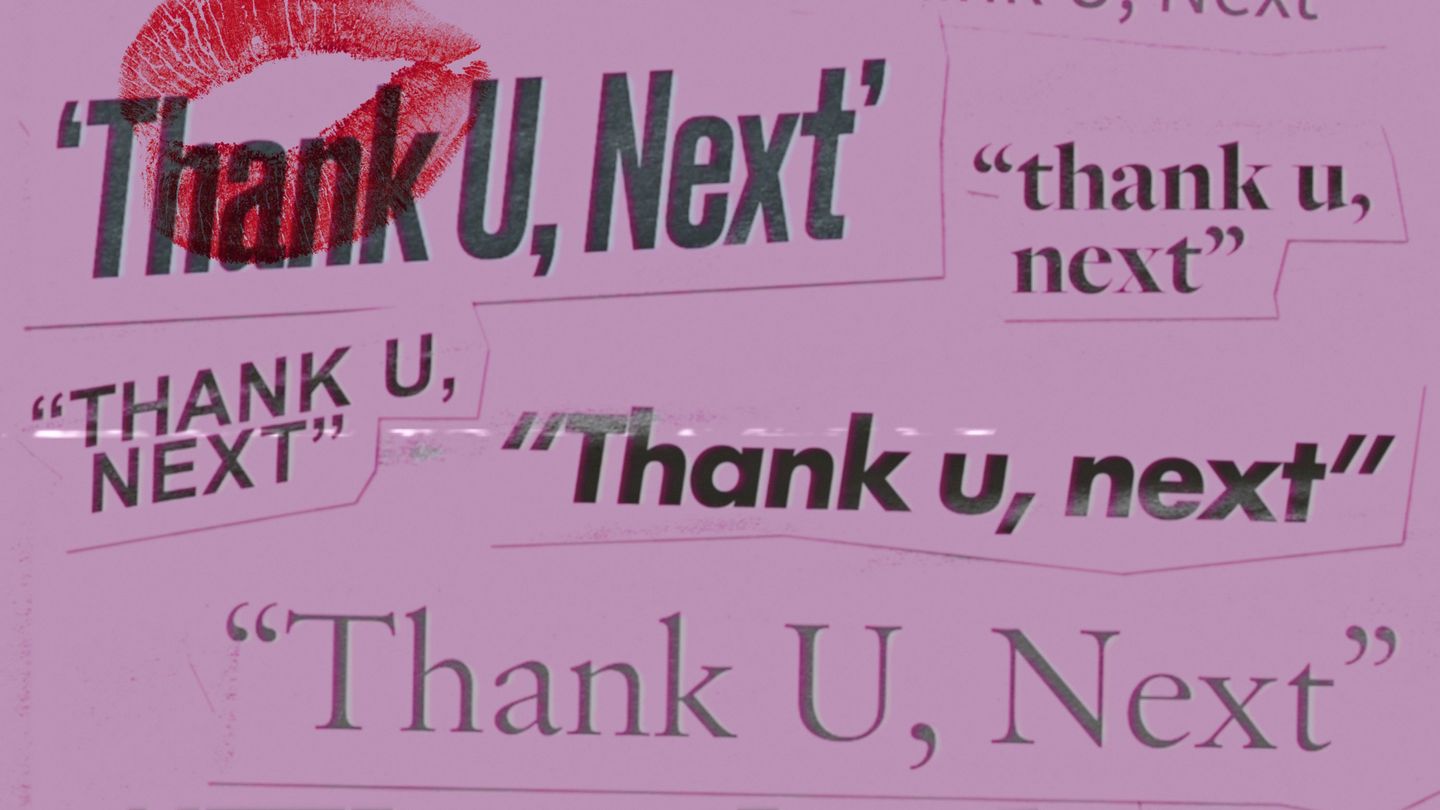Earlier this quarter I was asked: If given the opportunity to interview any artist, who and what would I ask? Like a predictive text, my answer came to mind immediately; I would ask Ariana Grande, “Are you okay?”
If you told me a year ago, even 8 months ago, that Ariana Grande’s wellbeing would be that important to me, I would have been shocked. While always a casual fan of her music (“Into You” was on more than a few of my 2017 playlists), I did not give her much credit artistically nor follow her too closely. However, as her new single “thank u, next” reaches its sixth week at number #1 on the Billboard Hot 100 and her name has become cemented as a casual conversation topic, it appears Grande has cultivated a new level of cultural capital this year.
When Ariana released her debut album Yours Truly in 2013, the landscape of the music industry was radically different from today’s disjointed and digital world. With the traditional album cycle yet to be broken and rap and hip-hop’s dominance yet to fully emerge, her career seemed to be crafted in the image of the pop stars who came before her. Emerging from Nickelodeon, Ariana was to take a path that had been well traveled, harnessing her fanbase from kids’ TV to a launch a musical career of super stardom in the vein of, say, a Britney Spears or Christina Aguilera. The album debuted at number one and its lead single “The Way” peaked at number 9 on Billboard’s Hot 100, signaling the birth of a bright new star in the top 40 galaxy. However, no one could have forecasted the upcoming changes in the cosmos of the charts. With a steady and expansive list of hits since her debut, Ariana easily solidified her place as a pop powerhouse, but a number one hit remained elusive.
In 2013, five out of the 11 songs which managed to hit number one on the Hot 100 were performed by female pop artists. By 2016, that number had fallen to three. Save for Camila Cabello’s “Havana,” which spent a mere week at #1 in early January, pop’s presence has been completely absent from the top of 2018’s charts. Amidst strong showings from hip-hop artists like Drake and Childish Gambino, female-driven pop songs seemed to have significantly lost their cultural clout. What does it take for a pop song to have a moment in 2018?
With the release of her fourth album Sweetener (2018), her first since the tragic 2017 Manchester terrorist attack on her Dangerous Woman Tour, Ariana faced a complicated challenge. Rather than falter through insensitivity, Grande got real. The album adopted an unabashed energy of enthusiasm focusing on love, light, and Ariana’s own struggles with anxiety. Sweetener signaled a marked shift in Ariana’s usual detached output of dance-centric pop, investigating its artist at a new level of intimacy and vulnerability. Ariana addresses her own struggles with mental health with songs like “breathin” and “get well soon,” encouraging her fans to reach out for help themselves. Ariana’s readiness to go there reveals why she resonates with a generation more open to discussing struggles outside the realms of the heart and the dance floor.
The transparency of the album corresponded with the singer’s use of social media, essentially fusing Grande’s personal journey with her music. Sweetener symbolizes the triumph of an artist finding her real voice, but more importantly a human recovering and thriving after crisis. The lightness and glee of the record flows seamlessly with events of Ariana’s own narrative, especially her relationship with comedian Pete Davidson. Photos detailing the two’s whirlwind romance came in at the same pace as details of the album. Her inclusion of the sweet “pete davidson” on the album’s final cut seemed to solidify her optimistic worldview. Upon the release of Sweetener, the album’s critical and commercial success appeared to be the final chapter of a seamless and ascendant album rollout.
However, as many are aware, the universe did not seem to stan the popstar as much as the rest of us. Rapper Mac Miller, Ariana’s ex of 4 years, passed away from an accidental drug overdose on September 7th, 2018, almost three weeks after Sweetener’s release. Ruthless internet trolls immediately spammed her social media blaming her for Miller’s death, in a similar manner to the claims that she was at fault for his May 2018 DUI. She backed out of the Emmys and other events while going silent on social media for the first time in years. In addition, rumors of a split from Pete Davidson spurred even more attention on her every move.
A statement released by her team declared: “Given the events of the past couple of years, Ariana is going to take some much needed time to heal and mend. She will be staying close to home and using this period to spend time with her loved ones and work on new music without deadline. She thanks her fans for their understanding.”
What makes Ariana Grande seem fresh amidst a crowded field of pop competitors is not the tremendous amount of trauma she has endured. Nor is it the triumphant comebacks she has made. Her old contemporaries, like Katy Perry and Lady Gaga, have released albums full of empty activism and stripped-down raw ballads in order to get personal, while the new pop forefront – made up of about fourteen photocopies of Dua Lipa – seems committed to the cause of hyper-produced dance songs lacking any sign of humanity. Grande’s music possesses an unrivaled ability to sound effortlessly and deeply personal.
Her resilience and consistent commitment to the messages of wellness, positivity, and self-care echo fluidly through her music and actions. In “get well soon,” a literal treatise on the importance of wellness from Sweetener, Ariana sings, “Babe, you gotta take care of your body… Ain’t no time to deny it, that is why we talking about it.” Unlike the empty lyrics of other radio muses, she practices what she preaches. In her own time of crisis, the star took time off, prioritizing her own mental and physical health. While many of the current voices of pop seem to lack any semblance of connection to the perfectly manicured image to which they are supposedly attached – think Katy Perry’s catastrophe of neo-activism, Witness (2017) – Ariana and her message seem to shine in perfect synergy.
Grande’s constant focus on positivity makes it easy to root for her each time she rises from tragedy. With “thank u, next,” Grande rose to the greatest heights of her career. Amidst the grief of a deceased lover and fallout of a public breakout, it would have been easy for any artist to produce a dark and angsty song. However, the single, released on November 3rd without any prior announcement, shone brightly instead with sweetness.
Ditching the long and storied history of veiled, bitter break-up songs, “thank u, next” calls out each of the singer’s exes by name not to throw shade at them, but to thank them. The first lines show that Ariana is not abandoning her previous record’s message, but doubling down on it: “Thought I’d end up with Sean / But he wasn’t a match / Wrote some songs about Ricky / Now I listen and laugh / Even almost got married / And for Pete, I’m so thankful / Wish I could say, ‘Thank you’ to Malcolm / ‘Cause he was an angel.” Toxic attitudes towards failed relationships, which dwell in negativity and resentment, are often fetishized in breakup songs (listen to pretty much any entry in Taylor Swift’s catalog). The behavior that most of these songs promote do not foster healthy attitudes, but rather amplify negative ones that prevent healing. Ariana’s recent movements show a new attitude towards failed relationships for a generation more aware of its own harmful practices.
By preaching evolution rather than execution, Grande continues to lead the pack in healthy, productive habits, and with an enormous queer following, the pop star’s words are all the more important. Ariana provides a much needed model for healthy behaviors and mature relationships for her queer fans in a time where the healthy is often trumped for the more sensational. Rather than solely profiting off of her relationship with gay fans or aimlessly quoting RuPaul, Ariana proves that she is a true ally by being an example of positive self-care for the community. Even more so, the swift release of the single and the promise of a new album so soon after Sweetener’s strong showing signal an energy of productiveness.
The single’s sugarcoated optimism resembles the attitude of Sweetener, but its perfectly crafted tone and masterful production give evidence of a more fully-formed vision. The song’s debut and current streak of seven weeks atop the Billboard charts signify that Grande’s personal touches and positive message strike a real chord with today’s listeners. In a time of divisive voices preaching negativity, an authentic message of personal growth seems to reflect a shift in tastes towards more mature and tempered ideas.
However, the song owes its biggest triumph not to its playful call out of her exes, but to her tease of a new lover. Who – in a surprise twist – is not a new beau, but “Ari” herself, shifting the track’s focus from lost love to self love. As the pop-star carefully recites the freshly poured foundations of her new relationship with herself, “She taught me love / She taught me patience / How she handles pain,” my old question finds its answer. Ariana is more than okay. She’s thriving.
![]()

